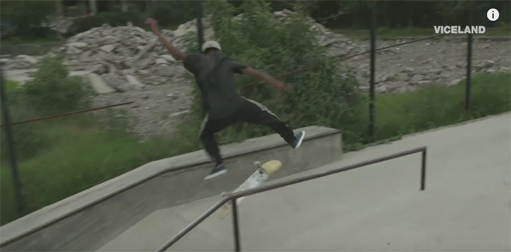If there’s one thing Viceland—the basic cable channel formerly known as History International and now run by the less academically minded Vice Media—loves, it’s weed. (See, for example: “Weediquette,” “Hamilton’s Pharmacopeia,” “Bong Appétit.”) If there’re two things Viceland loves, it’s weed and skateboarding. “Post Radical” is the politically incorrect, aprés-“CKY” channel’s newest addition catering to the “digital media-loving millennial” and “middle-aged skateboarder with knee arthroplasty” crossover demographic.In this travel/documentary series, modern skate culture gets the once-over courtesy of pro skater and “amateur anthropologist” Rick McCrank. The show tracks McCrank as he circumnavigates the globe in search of kids in Thrasher hoodies. The show’s first episode, for example, finds the elder statesman (at 42 years of age) heading to Malmö, Sweden, where he visits a cutting-edge high school built around an indoor skate park. Skateboarding, in fact, is an integral part of the school’s curriculum. (There are grades and everything.) What we find is a bunch of well-adjusted, middle-class “future world changers” who have bonded over their love of skating and found a reason not to drop out of school. The school’s easygoing principal makes the show’s keenest observation, noting that skateboarders will fall down a hundred times trying to accomplish a trick. Apply that determination to math and science, and you’ve got a plan for success. Later our host heads to a humble concrete playground in Ethiopia’s capital city of Addis Ababa—quite an opposite of Malmö, culturally and economically. There, a burgeoning skate culture is just starting to come to life. Street kids who’ve only seen skateboarding on YouTube videos are using a decidedly DIY approach to kick-start their country’s skateboarding scene. Here, skateboarding isn’t a carrot to keep them in school so much as an alternative to gangs, poverty and despair. The thread that ties these stories together is the universal desire for family, commonality, inclusion, self-styled tribal bonds.Mello Mr. McCrank isn’t exactly an investigative journalist and doesn’t dig all that deep into the worldwide ethnographic implications of his sport. It’s not like he’s quoting graduation rates and their connection to alternative schooling or anything. But he is genially highlighting a growing subculture that doesn’t get much attention from the mainstream. Does this mean skateboarding is going mainstream? The pilot features a brief discussion about the “fear of institutionalizing” skateboarding. Does using it as a teaching method take away the outlaw appeal? No conclusions are reached.McCrank’s digital video travelogue is accompanied by an odd, gruff-voiced narration. At one point it refers to McCrank as a “gentle seaman” and those of us at home as “dear viewers.” We’ll chalk that up to some lightweight mocking of the self-serious tone a lot of documentary travel shows take. Generally speaking the show doesn’t have a ton of style. It’s no “Parts Unknown.” Simple, straightforward and unabashed in its premise that the kids are all right, “Post Radical” isn’t for the unconverted. But if you can appreciate a solid hurricane grind or are curious to see what a halfpipe looks like in Africa, this may be the feel-good series you’ve been waiting for.
“Post Radical” premieres Tuesday, July 10, 6pm on Viceland.

